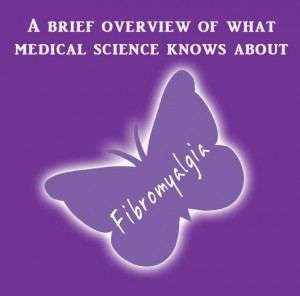A brief overview of what medical science knows about fibromyalgia
 Over the past decade researchers have established dysfunction in sleep, pain, and the stress response in fibromyalgia. Of course, even with all the current objective evidence of abnormalities in fibromyalgia, there are still doctors who don’t believe it’s real.
Over the past decade researchers have established dysfunction in sleep, pain, and the stress response in fibromyalgia. Of course, even with all the current objective evidence of abnormalities in fibromyalgia, there are still doctors who don’t believe it’s real.
A Harvard-trained neurologist recently said he thought it was “just a behavioral disorder.” However, if your doctor were to read an article in a major medical journal about fibromyalgia, the following points might be discussed:
• Abnormalities of the stress response
The nervous system has two ways to respond to stress, and dysfunction in both those systems have been described in fibromyalgia. One simple way to think of this is that the stress response gets stuck in the “fight-or-flight” mode in fibromyalgia.
• Disrupted sleep
Many studies have noted abnormalities in sleep in fibromyalgia. The major abnormality observed is a reduction in the amount and quality of deep sleep. Abnormal brain waves frequently interrupt deep sleep in fibromyalgia patients, resulting in poor sleep that is non-restorative.
• Low growth hormone levels
In adulthood, growth hormone is responsible for regulating the repair and maintenance of muscle and is primarily secreted during deep sleep and after exercise. Multiple studies have shown that patients with fibromyalgia have inadequate growth hormone release.
• Pain processing
There is dysfunction of the pain-processing systems in fibromyalgia. Studies show that the nervous system is hyper-reactive to stimuli. So pain hurts more, hot is hotter, loud is louder, etc. This process is called central sensitization. You can think of it as a nervous system that is turning up the volume on any input it receives.
This is just a very brief overview of of our scientific understanding of these problems. There are some very large gaps in current medical understanding of fibromyalgia.
Article Resources FASCIA: Clinical Applications for Health and Human Performance by Mark Lindsay For current research information: www.fasciaresearch.com | Liptan, Ginevra (2011-01-31). Figuring out Fibromyalgia: Current Science and the Most Effective Treatments




I have fibromyalgia and am having a hard time,love reading all about the research.
My fibro has now entered every way it possibly could into my life. I have my pain medication and it helps but wears off. Most days my insides feel like they’re going to fall out. Every thing I go to do, hurts. Whether making the bed, doing laundry, shopping, absolutely everything, leaving me with such a back, hip, and frontal pain I just lay down for the rest of the day. I was so active before. Busy all the time. Going and doing any and all with some aches. Those aches have now turned into such pain. I have not found a doctor in our area who can help at all.